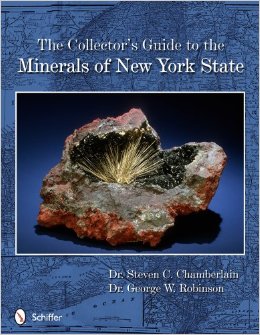
I recently ordered a copy of the new book by Dr. Steven C. Chamberlain and Dr. George W. Robinson titled "The Collector's Guide to the Minerals of New York State." The book was published this past year, and definitely filled an important void. New York State has a rich mineral history with many classic localities. This book focuses on many of those important New York mines and deposits.
What I liked about the book is its thorough coverage of the localities discussed, including a listing of the most important minerals found there as well as the current status. I also liked the way the book divided the localities by the geology type of the rock (i.e. occurrences in sedimentary rocks, crystalline rocks, and fractures as the main sections). The information is well-researched, with the authors having extensive field experience in localities in the state, combined with a wealth of knowledge on mineralogy and geology.
I would have liked to see more localities represented with a more thorough coverage of the entire state, especially on the lower section of the state. For example, there was not a single section on the minerals of Manhattan. Manhattan is truly a classic locality and extremely important in the state geology due to its extensive mineralization and urban enigma. Further, many additional downstate deposits in Rockland, Westchester, and Orange counties were not at all included or even addressed. There was very little on the historical iron mines in Ramapo Mountains/Hudson Highlands, which was once a major mining district with many iron mines, including famous ones such as the Sterling Mine and the Forest of Dean Mine. Also not discussed at all were the Valhalla Amazonites, the Palisades diabase minerals, Anthony's Nose Calcites, and Kerhonksen Selenites, to name a few. (Perhaps I am also more sensitive to these regions than most New York collectors since I live downstate and collect most in that area.)
The pictures in the book were excellent and well-represented. The specimen selection and photo were well-thought out and professionally done. However, several pictures did have artificial background with hard edges that could have had a better graphic job done to them.
Overall, I am very happy with the book and would highly recommend it. It is easy to read and hard to put down. I learned many additional details on deposits that I was already familiar with from this book. This book is available for purchase online at Amazon at the link below:
http://www.amazon.com/Collectors-Minerals-Schiffer-Science-Monograph/dp/0764343343
Follow Up:
After contacting Steve Chamberlain, one of the authors of this book, he mentioned to me that they were constrained by the publisher by limiting the book to 96 pages. This limited the number of localities they initially had in mind to include, and therefore, they could not properly focus on all localities within the state. However, they have a promise from the publisher to do a full mineralogy of New York State that would include "everything and the kitchen sink." This is quite an ambitious goal that may be too big to complete, but let’s hope they can pull through with this massive feat!